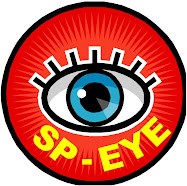 We live in a school district with many things. But one thing we mot definitely lack is any administrators with cojones. As Metallica would sing, "Sad, but true." The district office is populated by eunuchs. We thought that Joe Palooka might bring a pair with him to Buildings & Grounds, but apparently the rule is that one's cojones must be tuned over in order to obtain your district ID. Lord knows that Tim Culver grows evermore like Tootles, constantly in search of his lost marbles. Phil Frei is a fiscal wizard, but don't ask him to hold anyone accountable for paying their bills. Sad but true. One would think that collecting money due would be the prime directive for a Business Manager....wouldn't one?
We live in a school district with many things. But one thing we mot definitely lack is any administrators with cojones. As Metallica would sing, "Sad, but true." The district office is populated by eunuchs. We thought that Joe Palooka might bring a pair with him to Buildings & Grounds, but apparently the rule is that one's cojones must be tuned over in order to obtain your district ID. Lord knows that Tim Culver grows evermore like Tootles, constantly in search of his lost marbles. Phil Frei is a fiscal wizard, but don't ask him to hold anyone accountable for paying their bills. Sad but true. One would think that collecting money due would be the prime directive for a Business Manager....wouldn't one?Now we understand that money due to the district--and UNPAID--- for camps and such exceeds $40,000 just for the past school year alone. And the usual suspects are all whining and moaning about how to collect it. Or even whether to bother collecting it at all. Just tack maintenance costs onto the tax levy. After all...it's all for the kids, right?
Here is yet another version of 10 Things We Think We Think about field/facility rental:
 |
| Is it too much to ask? |
1. 40K of unpaid bills. How much RTI assistance would $40K buy? $40,000 represents 5% of the purported cost of turfing Ashley field. And that's just fees unpaid for 2012-13. That's lot of money we're throwing away.
2. The only "groups" unhappy about being charged for facility usage is coaches holding "for profit" camps. You don't see gaggles of blue haired old ladies screaming, "Don't charge the coaches for using the fields!" There are a lot of folks in the district without kids, and when they hear about this, they get angry, too. But that anger comes from the opposite position.
3. Are coaches employees of the school district over the summer? They retain their keys to buildings and use of e-mail. They do not collect unemployment. They have signed contracts for the next school year. An employee of a school district cannot profit from use of publicly owned facilities. It's against state law. So why are we enabling (facilitating?) it?
4. Is "negotiation" of fees owed even allowed? If so, what are the rules governing how one can reduce the fees for facility use via negotiation? is the same mechanism afforded to all similarly affected parties? e understand that some coaches have quietly haggling down the fees they owe. One would think that a Business Manager would understand how that doesn't work.
5. How can we expect ANY coach to pay their required fees if others refuse to pay? They either all must pay or none must pay. And the latter must not be an option. Hell it would violate policy KG as it exists today.
6. Why aren't we simply garnishing wages of those employees who refuse to pay for field/facility use for camps? We could attach our attorney and court fees for the collection process as well.
7. The "No Pay, No Play" concept will simply not fly. Next spring, the district eunuchs will relent and allow the camps to be run despite the coaches having yet another year of unpaid bills. Hell this has happened for years. The mantra seems to be, "We'll get 'em next year!" This has to be the year we get all the money due and start with a clan slate.
8. If the revenue from these camps truly gets turned over to the booster clubs, and they in turn give it back to the district in the form of equipment or uniforms, why don't we cut out the middleman? Have the coaches running camps have registration fees sent right to the district and the money be deposited into a sinking fund for that sport The district could then take a percentage fee off the top for field and facility maintenance. Then the boosters wouldn't have to spend any time depositing all that money.
9. And if the money is going to the booster clubs, why is it that the camp fees are mailed to the home address of the head coach running the camp? Why doesn't it get sent to the address for the booster club? We get it. The coaches should get "something" for their time. How about we tie it into their contracts. Hold a camp and you get $_____ extra dollars compensation.
10. Why are we even arguing about this? And why does it take so long? Would we allow the Facilities Manager to hold a concert in the PAC without paying a use fee and collect all revenues from attendees? Would we allow the Pool Manager to earn money on the side teaching swimming lessons in the high school pool without paying a fee? How about a group of employees to use the field house for a holiday craft fair --free of charge-- and then collect the revenue from charging vendors for booth space?
Stop pussyfooting around and make these folks --all of them---pony up the fees that are due! Thy were told they'd be charged...right? Because this all came to a head in June/July 2012...long before the start of 2012-1 camps.














